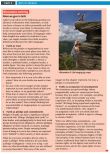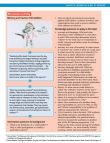Theory of Knowledge - evolve your style and strengthen critical awareness

By Eileen Dombrowski
...Within the limited circulation of ideas at the time, teaching TOK often resembled target practice - setting up each area of knowledge in turn, then blasting it full of holes for its biases and uncertainties. Only mathematics was left standing, bruised, with a battered version of physics by its side. I was astonished. Was this how you should lead a course that was supposed to give a holistic understanding of knowledge? I think my own approach to TOK emerged at first in protest, and has since evolved, just as TOK has as a subject.
Appreciate the range of knowledge
My approach, I hope, is fully appreciative of the range of knowledge and the interplay of subjectivity and objectivity in its creation – an approach in harmony with the current TOK course. To give students an understanding of how knowledge is constructed, I think we have to treat our humanity not as a problem but as the wellspring of our knowledge. We want to consider all of our ways of knowing and realize how they interact to build our varied areas of knowledge.
Recognize the interpretive nature of knowledge
Critically evaluate perspectives and knowledge claims
At the same time, though, not all interpretations are equally well grounded. It’s important to give critical and analytical attention to perspectives for how they shape knowledge claims, to help students become discerning in what they accept.
Students gain enormously if they understand that individual knowledge claims are often embedded within the assumptions and values of larger views, with an impact on the selection and treatment of supporting facts. They should also understand that the conclusions have implications for decisions or action. These framing views include the theories of academic knowledge, the interpretations of worldviews, or the calculated persuasion of interest groups.
In practice: develop student skills for the future
But we can’t teach students to think critically simply by lecturing them and handing them notes! Students need active practice in class discussions that stimulate their own exploration of knowledge questions, their own critique and argument, and their reflections on the views they hold themselves. As teachers we are facilitators and guides within a process of inquiry. We can certainly extend student ideas and fill in background on course topics – but after we have brought the questions to life.
Overall, I aim to give students understanding and skills to take away with them into their lives. I hope they will understand how we construct every day and academic knowledge and how essential sound methods and conclusions are for grasping and grappling with issues of the world. I hope that, when barraged by knowledge claims in the media and their communities, they will keep their minds open but at the same time apply their skills of critical thinking. Above all, I hope that they will be engaged thoughtfully in the wider world.
Eileen Dombrowski is an experienced TOK workshop leader who has a wealth of experience teaching TOK in international schools.
Theory of Knowledge Activities
© 2024 Oxford University Press. All rights reserved.




